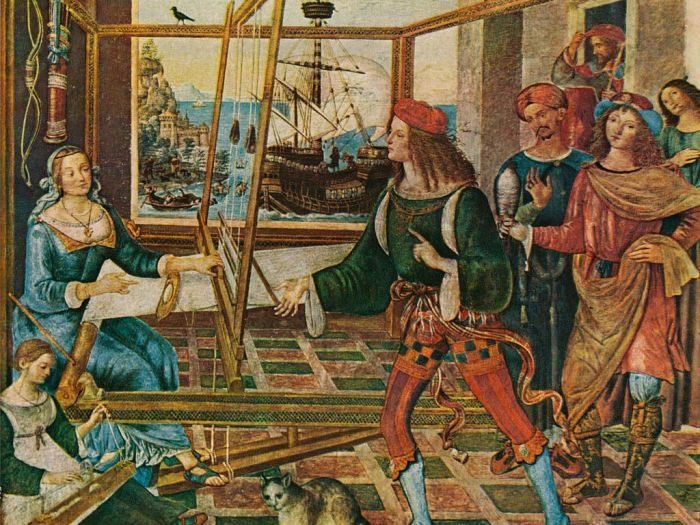TELEMACHUS SETS SAIL
“You should be ashamed yourselves,
mortified in the face of neighbors living round about! Fear the god's wrath before they wheel in outrage
make these crimes of yours recoil on your heads.”
Art: Telemachus and Mentor by Giovanni Battista Tiepolo, c. 1730-50, via @rijksmuseum , Amsterdam.
Before we chat about Book 2, turn back to Book 1 and look for the middle. It’s when Athena declares to Telemachus that Odysseus is still alive. It’s the news he has been waiting for, and it changes everything. What a scene event. Everything that follows is a chain of actions and reactions to that moment, and Book 2 is no exception. Telemachus has spent the night mulling over Athena’s instructions, and when he awakes the next morning, he’s not the same boy we met at the beginning of Book 1. He dressed, dons his sword, grabs his spear, and calls an assembly. Two hounds flank him as he arrives for the meeting. Notice how he’s moved from passive to active? Instead of bemoaning the suitors, he’s doing something about it. He’s stepping into his power as his father’s heir. “Fear the gods’ wrath!” He exclaims, telling them they should be ashamed of themselves. But the battle is not easily won. The suitors push back. “You want to blame us?” they retort. “What about your mother?” This is how we learn that Penelope has been holding the fort down for years, weaving a funeral shroud for old Laertes, and undoing the work every night. She’s as cunning as Odysseus himself, a true match. Why does she delay? Is she putting off the inevitable? Waiting for her son to be of age? Or perhaps—and this is what I like to think—she’s the steadfast picture of loyalty and hope. She believes, somehow, that Odysseus is still alive. She’s holding on to the kingdom for the promise that her husband will still return. In every way, Penelope is the anti-Clytemmestra we heard about in Book 1. She is strong. A ruler. Her husband’s equal in every way (as will be confirmed yet again in the final books). This is when Zeus sends a sign: an eagle. Odysseus is to return. But just as no one would believe Cassandra, who warned her fellow Trojans not to bring in Odysseus’s wooden horse, the suitors mock the prophecy of Odysseus’s homecoming—thus sealing their fate. Because now, they’ve not only overstayed their welcome, but have dared to mock the gods. Without further ado, Telemachus steals away and sets sail, with Athena, his guardian goddess, “in the pilot’s seat.”
-
Read the Odyssey online in the translation by Robert Fagles, or order the paperback.
Watch another background video on the possible science behind the myths of the Odyssey, from TED Ed.
